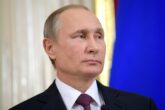December 13, 2021
How France Can Promote EU Interests in the UN Security Council
In January, France will take over the rotating presidency of the European Union, securing an opportunity to set the EU agenda. One key ambition for the French presidency will be to transform the bloc into a more capable geopolitical actor.
Paris already plans to hold a Summit on European Defense in February and will unveil the Union’s highly anticipated Strategic Compass document in March.
Within this context, there has recently been speculation—including from the spokesman of President Emmanuel Macron’s party in the National Assembly—about France transferring its permanent United Nations Security Council seat to the European Union.
Yet political and legal constraints make this unlikely in the short term. Instead, EU leaders should consider alternative arrangements that would accomplish similar goals.
France and Britain have consistently supported Germany in its bid for a permanent UNSC seat. However, these bids were opposed by some other EU member states (especially Italy) and the United States.
Permanent seat holders in the European Union (namely only France after Brexit) must foster EU interests when fulfilling their duties.
As a result, then-Vice Chancellor Olaf Scholz alternatively called for the conversion of the existing French permanent seat into an EU seat, building off of France and Germany’s then-upcoming shared presidency of the UNSC to promote EU positions and commitments in the UNSC.
As the European Union is a supranational union, it legally cannot have its own permanent seat on the UNSC. Instead, the European Union delegates its decision-making authority to member states that are in the UNSC.
Consequently, Scholz’s proposal noted that a permanent EU seat would remain a de jure French seat.
Scholz’s proposal was opposed by France, which argued that it already takes EU positions “into consideration” in the UNSC. Furthermore, the EU delegation arrangement allows France to take a proactive stance in the UNSC when the rest of the European Union has not reached consensus yet, ensuring a timely response to any emerging international crises.
Read the full story from Euractiv.
More from CNAS
-
Trump ‘Humiliated’ as Putin Sends Clear Message That He Doesn’t Care About US
"Putin is not playing ball." Putin's Palm Sunday attack on Sumy is "embarrassing for the White House" as it comes just days after Steve Witkoff met with the Kremlin, says adju...
By Jim Townsend
-
The Hidden Past and Uncertain Future of the U.S. and Ukraine with Celeste Wallander
Under the Trump administration, U.S. support for Ukraine is no longer guaranteed. President Trump's pause on aid and intelligence to Ukraine in March may have been brief, but ...
By Andrea Kendall-Taylor, Jim Townsend & Celeste Wallander
-
Is Russia Under Pressure?
Since 2014, the United States and its allies have provided increasing military support to Ukraine while imposing more and tougher economic sanctions on Russia, especially sinc...
By Jeffrey Edmonds
-
Europe's Trade War Woes
On April 2nd, President Trump imposed sweeping tariffs across the globe – with only a handful of countries left untouched. The EU was hit with tariffs of 20% and the European ...
By Andrea Kendall-Taylor & Jim Townsend



